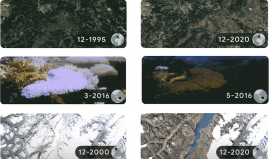Google commemorates Earth Day by displaying time-lapse satellite photos of melting glaciers, receding snow cover, deforestation, and coral bleaching to remind viewers of humanity's influence on the climate and ecosystem.
Google Doodle

The Google doodle for Earth Day 2022 contains four Gifs that will cycle during the day, built using satellite images and pictures from The Ocean Agency.
They illustrate glacier retreat on Tanzania's Mount Kilimanjaro between December 1986 and 2020 and glacial melt in Greenland's Sermersooq between December 2000 and 2020.
Other photos depict the impact of a coral bleaching incident on Australia's Great Barrier Reef at Lizard Island between March 2016 and October 2017 and deforestation in Germany's Harz woods between December 1995 and 2020.
According to climate counselor Lesley Hughes, the photographs of coral bleaching on the Great Barrier Reef, a professor of biology at Macquarie University in Sydney, are "a high-impact visual image" that would reverberate.
Critical Environmental Emblem
According to Hughes, the critical environmental emblem that we are guardians of symbolizes climate change's influence on an enormously diversified ecosystem.
As these photographs demonstrate, the physical and biological worlds are evolving right before our eyes, and there is no time to spare.
In March, the Great Barrier Reef saw its sixth major bleaching incident, with aircraft scans revealing nearly no reefs within a 1,200-kilometer span avoiding the heat - the first time this has happened during a La Nia year.
According to Hughes, for individuals in other parts of the world, photos of glacial ice melting would be as relevant.
The enormous and ancient glaciers of New Zealand are receding at an alarming rate.
Melting
According to the National Institute of Water and Atmospheric Research (Niwa), the Southern Alps lost a third of their permanent snow and ice between 1977 and 2014, a significant reduction that accelerated fast in the previous 15 years.
More recently, the summer of 2017-2018 saw temperatures in New Zealand rise by 3 degrees Celsius above average, reducing some glaciers to the point of disappearance.
As the glacier melts, relics buried for centuries in the Italian Alps are being discovered, including equipment left behind by soldiers camped out on the slopes during WWI and a 5,300-year-old murder scene when hikers found the mummified remains of Ötzi.
What has been a windfall to archaeologists is also a symptom of climate change's grave menace. Forni, one of Italy's major valley glaciers, has receded 800 meters in the last 30 years and 1.2 miles (2 kilometers) in the previous century.
According to the company, the pictures contrast with the upbeat tone of the Earth Day 2021 which was created to "urge everyone to discover one tiny act they can take to restore our Earth," according to the company.
Spreading Awareness
Hughes believes the shocking photographs released in 2022 were crucial for raising awareness and may be a response to the IPCC26 report.
"I think it's easy to get complacent about the bigger forces at work in our climate system and the implications those forces have when you're sitting in a middle-class setting, and it's a wonderful day, and the sun has come up or gone down," Hughes said.
"Reminding people that just because it's a beautiful day doesn't mean climate change has gone away is critical."
Google's parent company, Alphabet, claims to have been carbon neutral since 2007 and wants to run its data centers solely on renewable energy by 2030.
In 2020, the firm consumed 15.5 terawatt-hours of electricity, most of which was utilized to power its data centers. It also reduced the amount of garbage created by its activities by 40%, to 28,864 tonnes, while increasing water use.
Waiting for the Data
Although data for 2021 have not yet been released, the corporation claims that it has offset its emissions by purchasing enough renewable energy and offsets to meet its use.
For more environmental news update, don't forget to follow Nature World News!
© 2025 NatureWorldNews.com All rights reserved. Do not reproduce without permission.





